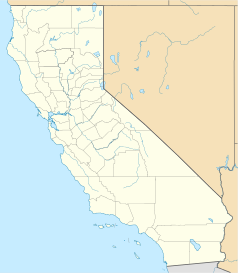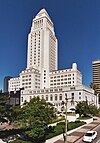Little Tokyo (Los Angeles)
| dzielnica Los Angeles | |
(c) I, Toksave, CC-BY-SA-3.0 Świątynia buddyjska w Little Tokyo | |
| Państwo | |
|---|---|
| Stan | |
| Miasto | |
| Dzielnica | Downtown Los Angeles |
| Powierzchnia | 0,33 km² |
| Populacja (2010) • liczba ludności |
|
| • gęstość | 3161 os./km² |
| Portal | |
Little Tokyo – dzielnica w śródmieściu Los Angeles w Kalifornii w USA. Jest jedną z trzech japońskich dzielnic, obok istniejących w San Francisco i San Jose w Stanach Zjednoczonych. Inne nazwy to Lil' Tokyo, J-Town lub Shō-tokyo (w języku japońskim). Powierzchnia – 0,33 km², liczba ludności – 1043 mieszkańców[1]. Dzielnica jest wpisana do rejestru National Historic Landmark i National Register of Historic Places.
Centrum kulturalno-społeczne ludności pochodzenia japońskiego w południowej Kalifornii. W dzielnicy znajdują się muzea i teatr, a także restauracje, kluby i sklepy japońskie oraz świątynie buddyjskie.
Położenie
Little Tokyo znajduje się na wschód od Civic Center. Ograniczone jest ulicami: Alameda Street, Temple Street, San Pedro Street, 1st Street, Los Angeles Street i 3rd Street.
Zobacz też
Przypisy
Linki zewnętrzne
- Strona Little Tokyo Community Council. ltcc.janet.org. [zarchiwizowane z tego adresu (2009-02-09)].
- Blog o Little Tokyo. blog.littletokyounplugged.org. [zarchiwizowane z tego adresu (2011-09-04)].
Media użyte na tej stronie
Autor: Alexrk2, Licencja: CC BY 3.0
Ta mapa została stworzona za pomocą GeoTools.
Autor: Uwe Dedering, Licencja: CC BY-SA 3.0
Location map of the USA (without Hawaii and Alaska).
EquiDistantConicProjection:
Central parallel:
* N: 37.0° N
Central meridian:
* E: 96.0° W
Standard parallels:
* 1: 32.0° N * 2: 42.0° N
Made with Natural Earth. Free vector and raster map data @ naturalearthdata.com.
Formulas for x and y:
x = 50.0 + 124.03149777329222 * ((1.9694462586094064-({{{2}}}* pi / 180))
* sin(0.6010514667026994 * ({{{3}}} + 96) * pi / 180))
y = 50.0 + 1.6155950752393982 * 124.03149777329222 * 0.02613325650382181
- 1.6155950752393982 * 124.03149777329222 *
(1.3236744353715044 - (1.9694462586094064-({{{2}}}* pi / 180))
* cos(0.6010514667026994 * ({{{3}}} + 96) * pi / 180))
Autor: NordNordWest, Licencja: CC BY 3.0
Location map of California, USA
An approximation of the seal of Los Angeles, California. On March 27, 1905 Ordinance 10,834 authorized and described the City Seal still being used today.[1].
The flag of Navassa Island is simply the United States flag. It does not have a "local" flag or "unofficial" flag; it is an uninhabited island. The version with a profile view was based on Flags of the World and as a fictional design has no status warranting a place on any Wiki. It was made up by a random person with no connection to the island, it has never flown on the island, and it has never received any sort of recognition or validation by any authority. The person quoted on that page has no authority to bestow a flag, "unofficial" or otherwise, on the island.
Flag of California. This version is designed to accurately depict the standard print of the bear as well as adhere to the official flag code regarding the size, position and proportion of the bear, the colors of the flag, and the position and size of the star.
Autor: Brion VIBBER, Licencja: CC-BY-SA-3.0
West facade of the Los Angeles City Hall — in Downtown Los Angeles, California.
- In process of seismic upgrading, this 1928 high-rise building was placed atop a mechanical system of isolators, sliders, and dampers called "base isolation technology".
- It is the tallest base-isolated structure in the world.
(c) I, Toksave, CC-BY-SA-3.0
w:Koyasan Buddhist Temple, Little Tokyo, Los Angeles














